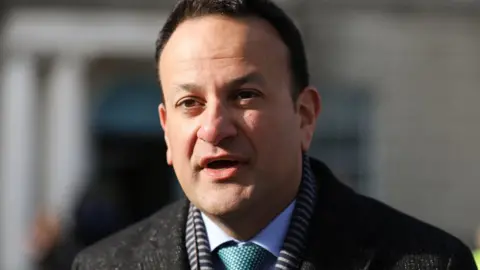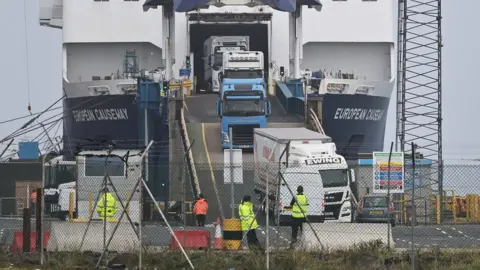Leo Varadkar says border poll not appropriate at this time
 Damien Storan
Damien StoranA border poll on the island of Ireland would "not be appropriate or right" at this time, the Tánaiste (Irish deputy PM) Leo Varadkar has said.
Mr Varadkar described the aspiration to a united Ireland as a "legitimate one".
However, he added that a border poll at this stage would be both "divisive and defeated".
He told BBC NI's Sunday Politics show that the focus should be on getting the Northern Ireland Assembly "up and running".
Mr Varadkar added that issues around post-Brexit trading arrangements - known as the Northern Ireland Protocol - needed to be resolved and he thinks "that can be done".
Provisions for a possible border poll on Irish reunification are included in the Good Friday Agreement - the deal which led to peace in Northern Ireland after decades of violence.
It states that the Northern Ireland secretary must call a border poll if it at any time it appears "likely" to that a majority of people in Northern Ireland would vote for a united Ireland.
Mr Varadkar said the "tests around when a border poll can and should happen" needed to be clarified.
"Because I doubt any secretary of state would make that decision without consulting the prime minister and the cabinet and it doesn't really say clearly how that test is applied as, to whether there is consistent public support for it," Mr Varadkar added.
"Is the secretary of state supposed to look at the assembly election results? Is it independent polls? What is it?"
 Getty Images
Getty ImagesSinn Féin chairman Declan Kearney said Mr Varadkar's comments were "abjectly lacking in ambition and politically weak".
"There is a responsibility on the Irish government to plan for constitutional change on this island, and that should start with the establishment of a citizens' assembly to discuss for the future without any further delay," he added.
Mr Kearney said the Irish government should "start the process of planning the transition to Irish unity, and use its formidable resources nationally, and internationally to place the constitutional future of our country at the centre of its diplomatic mission".
Sinn Féin won the most seats in May's assembly election but the Democratic Unionist Party (DUP), which came second, is refusing to re-enter a power-sharing executive until its concerns about the protocol are addressed.
The UK government's plans to override parts of the Brexit deal passed their first hurdle in Parliament on Tuesday.
The bill would allow ministers to change the part of 2019 deal that introduced post-Brexit checks on goods sent from Great Britain to Northern Ireland.
Speaking after that vote, Mr Varadkar said the UK government had not been "even handed" when it came to resolving the row over the protocol.
He accused No10 of "siding" with unionists in seeking to scrap parts of the deal.
Mr Varadkar said the government's bid to unilaterally change the protocol was a "strategic mistake".
Foreign Secretary Liz Truss has argued the bill is justified because the EU had not shown enough "flexibility" during negotiations to change the relevant part of the 2019 deal.
'Anger building'
Some have contended that the government's plan to override part of the Brexit deal breaks international law.
Irish Foreign Affairs Minister Simon Coveney and his German counterpart Annalena Baerbock have warned there is "no legal or political justification for unilateral action".
Writing in a joint article for the Observer newspaper on Sunday, they argued that the protocol explicitly recognises Northern Ireland's constitutional position within the UK, and is bringing real economic benefit to the region and protecting the EU's single market.
"The tabling of legislation will not fix the challenges around the protocol," they said.
"Instead it will create a new set of uncertainties and make it more challenging to find durable solutions."
Labour's House of Lords leader Baroness Smith said the bill was expected to reach peers before October.
The former Northern Ireland Office minister said anger was building in relation to the bill, and accused the government of "taking its eye off the ball" over Northern Ireland.
"I've already had a number of phone calls and people queuing at my door to talk about what can we do about this bill," Baroness Smith told BBC NI's Sunday Politics programme.
"The debates in the House of Commons particularly and the lack of decent government answers has really set people off."
